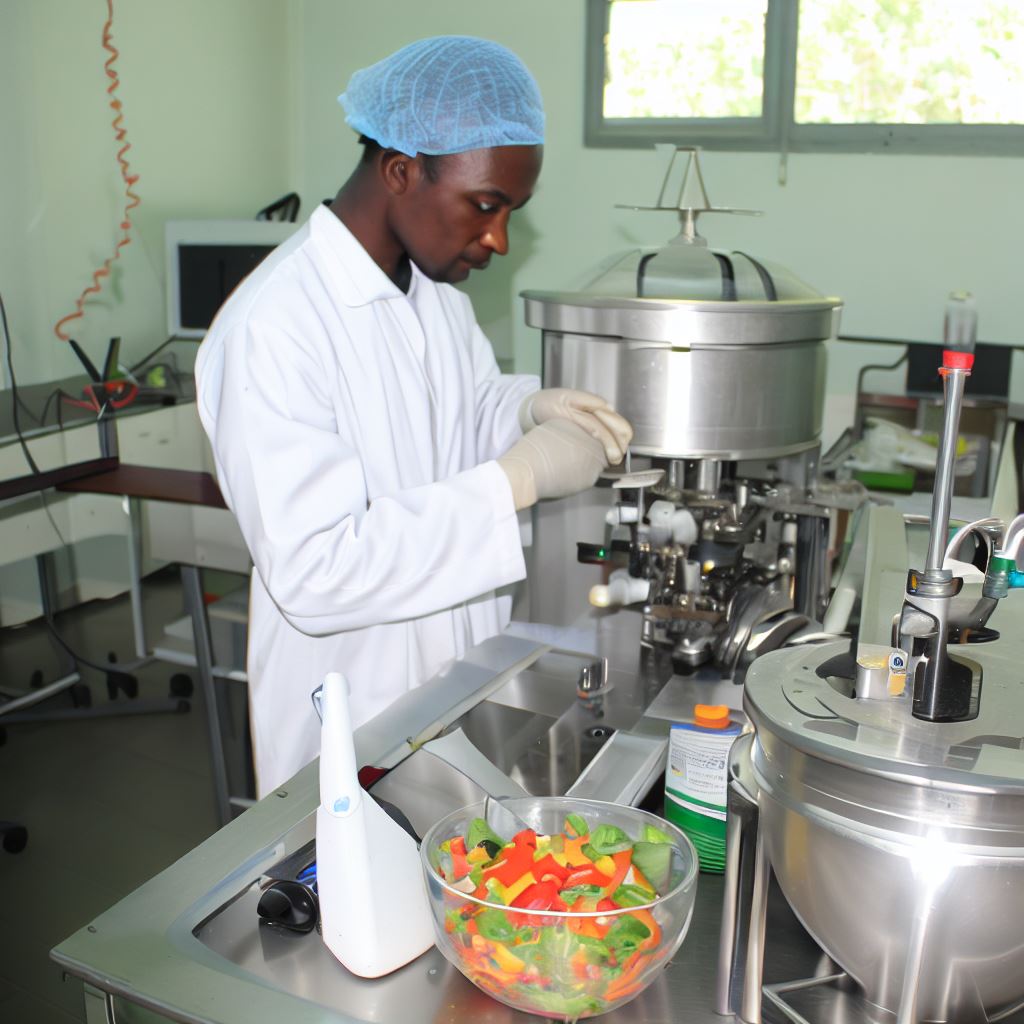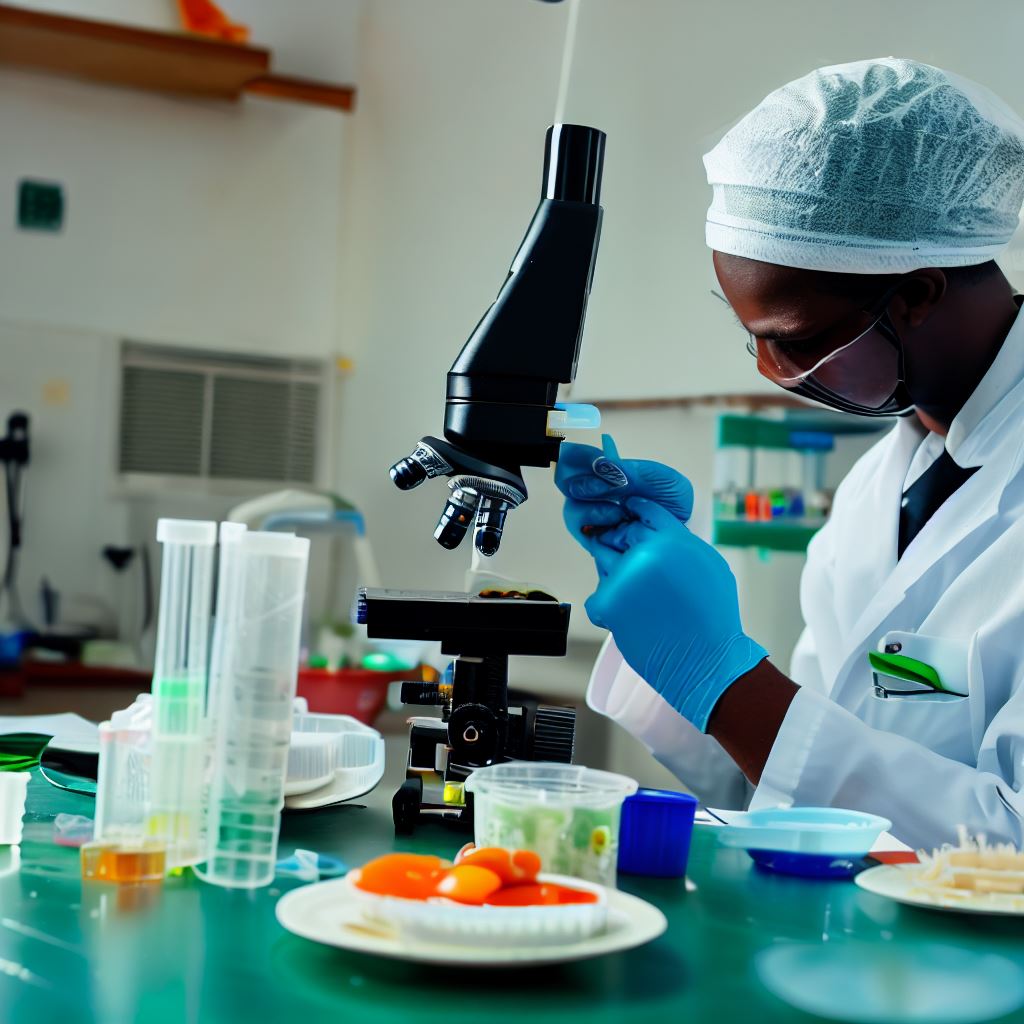Introduction
The intersection of technology and food science in Nigeria is a dynamic and transformative force.
In recent years, the infusion of technology into the field of food science has revolutionized the country’s food industry, leading to improved food security, quality, and innovation.
This blog post delves deep into the exciting world where technology and food science converge, shedding light on the pivotal role technology plays in shaping the future of Nigeria’s food landscape.
We will explore how technological advancements are enhancing food production and preservation.
These innovations address unique challenges in Nigeria’s food industry.
Overview of Food Science in Nigeria
General overview of the food science field in Nigeria
Food science is a crucial field in Nigeria, encompassing various scientific disciplines that relate to food production, processing, preservation, and distribution.
It plays a vital role in the overall food industry, ensuring food safety and quality throughout the entire supply chain.
Food scientists in Nigeria focus on improving nutritional value, taste, texture, and appearance of food products while also addressing food security and sustainability.
Significance of Food Science in Ensuring Food Safety and Quality
Food science is instrumental in ensuring that the food consumed in Nigeria is safe and of high quality.
Through various techniques and processes, food scientists can inspect and analyze food samples to detect any potential hazards or contaminants.
They also develop innovative methods for food preservation, packaging, and storage to extend the shelf life of products and maintain their nutritional value.
Furthermore, food science plays a critical role in preventing foodborne illnesses by implementing strict hygiene standards and quality control measures.
Major Challenges Faced by the Food Industry in Nigeria
Despite its importance, the food industry in Nigeria faces several challenges that hinder its growth and development.
One of the primary challenges is inadequate infrastructure, including inadequate storage facilities, unreliable electricity supply, and poor transportation networks.
These factors contribute to post-harvest losses and deterioration of perishable food items, impacting both food safety and economic sustainability.
Another significant challenge is the lack of skilled personnel and limited research capacity in food science and technology.
Nigeria also grapples with insufficient funding for research and development, which hampers innovation and technological advancements in the food industry.
The absence of comprehensive regulatory frameworks and enforcement systems further exacerbates issues related to food safety and quality assurance.
Additionally, the reliance on traditional food preservation and processing methods often results in limited product diversification and value addition.
These challenges highlight the urgent need for investment in infrastructure, research, education, and policy development to bolster the food industry in Nigeria.
Read: Salary & Benefits: Forensic Pathologists in Nigeria
Role of Technology in Food Science
In recent years, technology has played a significant role in enhancing food production and processing in Nigeria.
This has led to improvements in food packaging, storage, and transportation.
Additionally, technology has strengthened food safety and quality control measures.
- Enhanced Food Production and Processing: Technology has revolutionized food production and processing in Nigeria, making it more efficient and cost-effective. Advanced machinery and equipment have facilitated increased crop yields and improved processing methods, leading to a higher production of food products.
- Improved Food Packaging: Technological advancements have revolutionized food packaging in Nigeria. Companies now use innovative packaging materials and techniques to prolong the shelf life of food products, maintain their freshness, and prevent spoilage. This has contributed to reducing food waste.
- Efficient Storage and Transportation: Technology has greatly improved storage and transportation methods in the food industry. The introduction of cold storage facilities and refrigerated trucks ensures that perishable food items are kept at the required temperature during transportation. This minimizes the risk of spoilage and contamination.
- Food Safety and Quality Control: The use of technology has significantly enhanced food safety and quality control measures. Advanced equipment and systems are now employed to detect contaminants, monitor food production processes, and ensure adherence to strict quality standards. This has led to safer and higher-quality food products for consumers.
- Implementation of Automated Manufacturing Processes: With the help of technology, food processing companies in Nigeria have embraced automated manufacturing processes. This has streamlined production, reduced human errors, and improved overall efficiency. Additionally, automation has enabled consistent product quality and increased production capacity.
As technology continues to advance, it will likely drive further innovations in the field of food science.
Read: Top Schools for Forensic Pathology Studies in Nigeria
Examples of Technological Innovations in Nigerian Food Industry
The Intersection of Technology and Food Science in Nigeria
The technological advancements in Nigeria have greatly impacted the food industry, revolutionizing the way food is produced, processed, and delivered.
- Mobile Applications for Food Delivery and Online Food Ordering: In recent years, several mobile applications have emerged that allow consumers to order food online and have it delivered to their doorstep. Examples include Jumia Food, UberEATS, and Glovo. These apps provide a convenient and efficient way for people to access a wide range of food options from various restaurants, all with just a few clicks on their smartphones. The integration of GPS tracking and real-time updates ensures timely and accurate food delivery.
- Adoption of Automation and Robotics in Food Processing: Nigerian food processing companies are increasingly incorporating automation and robotics into their operations. This shift has improved efficiency, reduced production costs, and enhanced food quality. For instance, automated sorting and grading machines are used to sort fruits and vegetables based on size, color, and quality, allowing for a more standardized and consistent product. These technologies not only increase productivity but also minimize labor requirements.
- Remote Monitoring and Control Systems: In Nigeria, remote monitoring and control systems are being employed to improve food safety and quality control. These systems involve the use of sensors and cameras to monitor critical parameters. These parameters include temperature, humidity, and air quality in storage facilities, processing plants, and transportation vehicles. This technology ensures that food products meet the necessary standards before reaching the consumers, thereby enhancing food safety and consumer satisfaction.
Read: Forensic Pathology Tools and Techniques in Nigeria

Benefits of the Intersection between Technology and Food Science
In today’s blog section, we will explore the benefits of the intersection between technology and food science in Nigeria.
By integrating technology into food science, we can achieve positive outcomes and advancements in various aspects of the food industry.
Improved Efficiency in Food Production and Processing
- Automation of processes in food production and processing reduces manual labor and increases productivity.
- The use of modern machinery and equipment ensures faster and more efficient food processing.
- Technology enables better inventory management and reduces waste in the production process.
- Precision farming techniques, enabled by technology, result in higher yields and more efficient use of resources.
- Real-time monitoring and control systems help optimize production parameters and ensure consistent quality.
Enhanced Food Safety and Quality
- Technology enables the implementation of effective traceability systems, ensuring the source and quality of raw materials.
- Automated quality control systems detect and remove defective products, improving overall product quality.
- Food safety measures, such as temperature control and hygiene monitoring, can be automated, reducing human error.
- Technology facilitates quick identification and response to food safety issues, minimizing health risks.
- Data analytics and predictive modeling help identify potential food contamination risks, enabling prevention measures.
Innovation and Advancements in Food Science
- Technological advancements promote the development of new food products and recipes.
- Improved food processing techniques lead to the creation of healthier and more nutritious food options.
- Research and development can be accelerated with the aid of technology, leading to constant advancements.
- Technology enables the identification of novel food sources and alternative ingredients.
- Virtual reality and augmented reality applications can enhance consumer experiences and food education.
Increased Productivity and Economic Growth
- The integration of technology and food science leads to increased productivity, contributing to economic growth.
- Efficient food production and processing systems create job opportunities in the technology and food sectors.
- Advanced food processing techniques open up export opportunities, boosting foreign exchange earnings.
- Improved food safety and quality standards enhance consumer trust and increase market demand.
- Investment in technology and food science drives innovation, leading to a competitive food industry.
The intersection between technology and food science in Nigeria brings numerous benefits.
Embracing technology in the food industry is crucial for Nigeria’s development and the improvement of its food security and overall food system.
Read: Success Stories: Leading Forensic Pathologists in Nigeria
Challenges and Future Opportunities
The Intersection of Technology and Food Science in Nigeria: Challenges and Future Opportunities
- Lack of Awareness and Access: One of the major challenges in implementing technology in the Nigerian food industry is the lack of awareness and access to technological advancements. Many food businesses and farmers are not aware of the potential benefits that technology can bring, and they often lack the resources and infrastructure to adopt them.
- Limited Infrastructure: Another challenge is the absence of a robust and reliable infrastructure. Nigeria faces significant challenges in terms of electricity supply, internet connectivity, and transportation systems. Without a stable infrastructure, it becomes difficult to fully leverage technology in the food industry.
- Cost and Affordability: The high cost of technology can be a significant barrier for small-scale farmers and food businesses in Nigeria. Many technological solutions require substantial investment, making them unaffordable for those with limited financial resources. This further restricts the adoption and implementation of technology in the food industry.
- Skills and Education Gap: The lack of adequate skills and education in the food industry also poses a challenge. Technology often requires specific knowledge and expertise to be utilized effectively. However, there is a gap in the availability of skilled professionals who can understand and effectively use technology in the food sector.
- Infrastructure Development: To overcome the challenges mentioned above, there is a need for significant infrastructure development. Nigeria must invest in improving electricity supply, expanding internet connectivity, and enhancing transportation systems to create an enabling environment for the adoption of technology in the food industry.
While there are challenges in implementing technology in the Nigerian food industry, there are also significant future opportunities.
Infrastructure development, technological advancements, improved productivity, enhanced food safety, and market expansion are some of the potential benefits that this intersection can bring.
By addressing the challenges and embracing technology, Nigeria can unlock the full potential of its food industry and contribute to its overall socio-economic development.
You Might Also Like: Mapping the Future: Cartography as a Career in Nigeria
Conclusion
We have highlighted how technology has revolutionized agriculture and food production in the country.
We have also discussed the significance of this intersection, including improved food security and increased productivity.
Furthermore, there are hopes for future advancements in this field, with the potential for even greater innovation and development.
Overall, the intersection of technology and food science in Nigeria holds great promise for the future of the country’s food industry.




